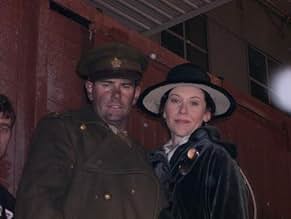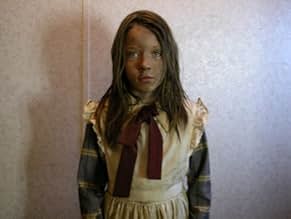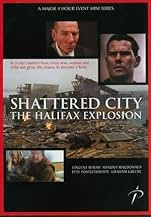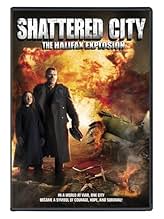IMDb-BEWERTUNG
6,7/10
420
IHRE BEWERTUNG
Füge eine Handlung in deiner Sprache hinzuA true story about the tragic explosion at Halifax Harbour, Canada, in the early hours of December 6, 1917.A true story about the tragic explosion at Halifax Harbour, Canada, in the early hours of December 6, 1917.A true story about the tragic explosion at Halifax Harbour, Canada, in the early hours of December 6, 1917.
- Auszeichnungen
- 8 Gewinne & 6 Nominierungen insgesamt
Folgen durchsuchen
Empfohlene Bewertungen
Unfortunately like many Canadians I had never heard about this event in school. It wasn't until my 20th year when I visited Halifax for the first time that I learnt of this horrific tale. This movie did an adequate job at telling the story. The acting was competent as was the over-all story (although I thought the German spy thing came across as silly). I particularly liked the acting of the two youngest children of the family that this movie revolves around.
I don't know if it was me or not but there seemed to be a lot more commercial breaks than in regular made for TV movies. As soon as the plot started moving it had to stop for yet another commercial break and being produced by the CBC and funded by corporate sponsors we see the same commercials over and over again which ruined my experience watching the movie.
This is a story that needs to be told and should never be forgotten. It is as devastating as "Sept 11".
I don't know if it was me or not but there seemed to be a lot more commercial breaks than in regular made for TV movies. As soon as the plot started moving it had to stop for yet another commercial break and being produced by the CBC and funded by corporate sponsors we see the same commercials over and over again which ruined my experience watching the movie.
This is a story that needs to be told and should never be forgotten. It is as devastating as "Sept 11".
My commentary: First and foremost, while the emphasis was on human error in the movie, the fact is war is a very fertile breeding ground for accidents on top of the deliberate carnage. "Saving Private Ryan" noted this with the mention of the glider that was fitted with armor plating - but no one thought to tell the pilot. So it crashes and six soldiers are killed needlessly. Accounts of war proliferate in tragic incidents such as that one. The Halifax Explosion must be the biggest war-related accident in history.
The Great War featured incomprehensibly vast usage of artillery shells, and artillery shells need TNT and other explosives. A lot of this had to be imported from the U.S., and by ships. Ships had to be gathered in ports. Ports will then see a lot of ships coming and going, and harbor masters are going to be pressed to keep all this traffic moving. The odds were considerable something like the incident of Dec. 6th, 1917 would happen someplace in Allied ports sooner or later.
Captain Le Medec probably wasn't the greatest or bravest mariner of all time. But how many ship captains who have seniority or pull are going to agree to captain a massive floating bomb at the height of the U-boat menace? Second, did anyone notice that the movie exonerates harbor pilot Mackie while making Le Medec and the Belgian captain look like total dolts at the helm; and has Mackie trying to avert disaster while the Frenchman funks off with his crew? Considering it is a Canadian and not a French production, what a surprise.
Then there is the almost defeatist speech Capt. Collins gives to the war rally in the church. Excuse me, an *officer* in HM forces blurting out like that? It simply wouldn't have happened at the time. Contrary to what he later tells Barbara, Germans weren't close to suing for peace at the time, and the war wasn't kept going only because the Allies wanted another year of war profits. Indeed, with the Western Front stalemated and Russia close to surrender, Ludendorff et al were convinced victory for Germany was just around the corner. And a lot of people on the Allied side feared the same thing.
On the plus side, I was impressed by what the production did with a limited CBC budget.
The Great War featured incomprehensibly vast usage of artillery shells, and artillery shells need TNT and other explosives. A lot of this had to be imported from the U.S., and by ships. Ships had to be gathered in ports. Ports will then see a lot of ships coming and going, and harbor masters are going to be pressed to keep all this traffic moving. The odds were considerable something like the incident of Dec. 6th, 1917 would happen someplace in Allied ports sooner or later.
Captain Le Medec probably wasn't the greatest or bravest mariner of all time. But how many ship captains who have seniority or pull are going to agree to captain a massive floating bomb at the height of the U-boat menace? Second, did anyone notice that the movie exonerates harbor pilot Mackie while making Le Medec and the Belgian captain look like total dolts at the helm; and has Mackie trying to avert disaster while the Frenchman funks off with his crew? Considering it is a Canadian and not a French production, what a surprise.
Then there is the almost defeatist speech Capt. Collins gives to the war rally in the church. Excuse me, an *officer* in HM forces blurting out like that? It simply wouldn't have happened at the time. Contrary to what he later tells Barbara, Germans weren't close to suing for peace at the time, and the war wasn't kept going only because the Allies wanted another year of war profits. Indeed, with the Western Front stalemated and Russia close to surrender, Ludendorff et al were convinced victory for Germany was just around the corner. And a lot of people on the Allied side feared the same thing.
On the plus side, I was impressed by what the production did with a limited CBC budget.
I really liked Vincent Walsh as the lead. He was very convincing in both the family-oriented scenes and the action stuff. The impending tragedy and the mundane actions that led to it were well-played and very gripping. It was nice to see a number of veteran Canadian actors like Lynne Griffin and Graham Green in large and small roles. I also thought the subplot about German saboteurs was both nicely diverting and added to the suspense. While Canadian productions can never hope to compete with Hollywood for budget and special effects, they can provide a Canadian "feel" to a project and "Shattered City" does that very well.
I have to thank CBC, actually, for making this movie. Before a visit to Halifax on the QE2, I had never heard of the Explosion (typical American - although, in fact, I'm Canadian-born). But even seeing the great memorial didn't really register the extent of the disaster until I saw the movie. Yes, characters were combined or fictionalized in some cases, but that is absolutely secondary to the portrayal of that horrific episode in Canadian history. The effects of the blast were particularly well done. I hope it plays again, as indeed it should every couple of years or so, to remind us all of both the losses and the bravery incurred that day.
The Halifax Explosion was a turning point in Canadian history. It shook a young country, but left it stronger, if not more sober.
The CBC's "Shattered City" uses fiction to tell the story of the Halifax Explosion. Some of the actors put in good performances, although many are stiff. My major grievance is with the use of fiction. The viewer is not able to discern truth from fantasy. In fact, at the film's conclusion, a short clip shows the actors explaining they had not ever learned anything about the Hfx Explosion. This may be true for many Canadians, as well as people in other countries. The story has little to teach us, because it fails to recognize the greatness of the real story.
The CBC's "Shattered City" uses fiction to tell the story of the Halifax Explosion. Some of the actors put in good performances, although many are stiff. My major grievance is with the use of fiction. The viewer is not able to discern truth from fantasy. In fact, at the film's conclusion, a short clip shows the actors explaining they had not ever learned anything about the Hfx Explosion. This may be true for many Canadians, as well as people in other countries. The story has little to teach us, because it fails to recognize the greatness of the real story.
Wusstest du schon
- Wissenswertes1,951 people were killed
- PatzerThere is a scene at the railway station in which a rail car carries the old CNR logo (A maple leaf with a box inside it containing the words "Canadian National Railways"). The CNR was formed in 1923.
- Crazy CreditsThis film is dedicated to the spirit and the memory of Constance "Connie" Bond Young August 9, 1911 - February 22, 2003
- VerbindungenFollowed by City of Ruins: The Halifax Explosion (2003)
Top-Auswahl
Melde dich zum Bewerten an und greife auf die Watchlist für personalisierte Empfehlungen zu.
Details
- Erscheinungsdatum
- Herkunftsland
- Offizieller Standort
- Sprache
- Auch bekannt als
- La explosión de Halifax
- Drehorte
- Produktionsfirmen
- Weitere beteiligte Unternehmen bei IMDbPro anzeigen
- Laufzeit2 Stunden 55 Minuten
- Farbe
- Sound-Mix
- Seitenverhältnis
- 1.78 : 1
Zu dieser Seite beitragen
Bearbeitung vorschlagen oder fehlenden Inhalt hinzufügen

Oberste Lücke
By what name was Shattered City: The Halifax Explosion (2003) officially released in India in English?
Antwort




























